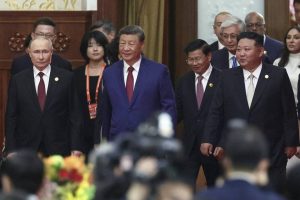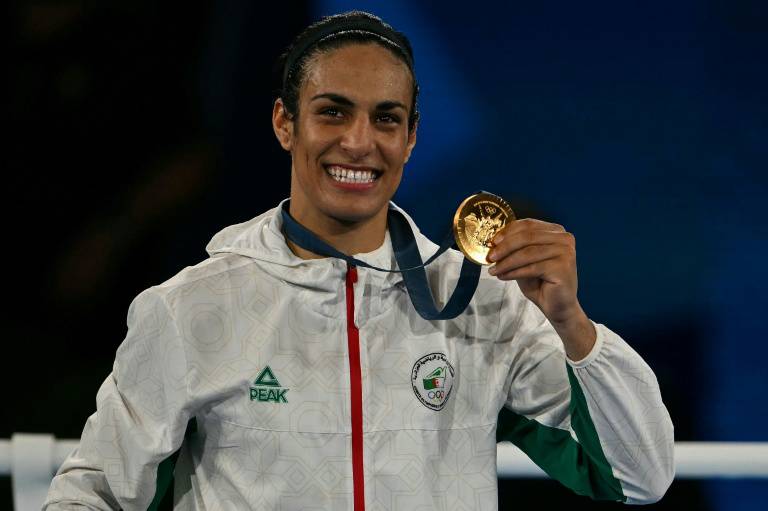Lausanne (Switzerland) (AFP) – Challenging the new gender verification tests imposed by the World Boxing organization before the Court of Arbitration for Sport (CAS), Algerian boxer Iman Khelif has launched a battle that goes beyond the ring to include athletics, swimming, and the entire Olympic community.
In a brief statement on Monday, CAS revealed an appeal filed on August 5 by the Olympic champion in the -66 kg weight class at the Paris 2024 Olympics, where significant controversy arose regarding her gender eligibility.
Khelif requested the annulment of a decision by World Boxing taken in late May that barred her from participating in June at the Dutch Eindhoven championship due to her refusal to undergo the newly implemented chromosomal test, and in all competitions held since then.
She also demanded to participate “without undergoing the test” in the upcoming World Championship in Liverpool, England, scheduled between Thursday and September 14, according to CAS based in Lausanne, Switzerland.
The latest request by Khelif is not expected to be accepted, as CAS refused to grant a stay of execution and has yet to set a hearing date for the main case.
Last month, Khelif denied claims by her former coach that she would retire from boxing.
She wrote on her Facebook page, “I want to clarify to the public that reports about my retirement from boxing are false,” accusing her former coach Nasser Yafesh of “betraying trust and the country with false and malicious statements… This person no longer represents me in any way.”
Transgender and Intersex Athletes
During the Paris Olympics, Khelif faced attacks and campaigns questioning her gender identity, similar to Taiwanese boxer Lin Yu-ting (who will not participate in the upcoming World Championship), being described as a “man fighting women.” Ultimately, the 26-year-old Algerian won the gold medal in the -66 kg category.
Khelif, born and raised as a girl, was accused by the former International Boxing Association (IBA), which had a dispute with the International Olympic Committee before being suspended, of carrying XY chromosomes, and was consequently banned from the 2023 World Championship after competing in women’s events without controversy.
Her appeal will provide the first legal opportunity to discuss gender verification tests in global sports, which were in effect at the Olympics between 1968 and 1996, through World Boxing as well as in swimming and athletics.
The polymerase chain reaction (PCR) test requires the absence of the SRY gene located on the Y chromosome, an indicator of maleness, to participate in women’s competitions. Supporters praise this method for its simplicity.
This test would exclude transgender athletes as well as those considered female but carrying XY chromosomes, a form of intersex condition.
IOC Engaged Since June
This test was abandoned after the 1996 Atlanta Olympics following widespread criticism from the World Medical Association, human rights organizations, and the scientific community.
Australian scientist Andrew Sinclair, who discovered the SRY gene in 1990, recently warned in The Conversation magazine that “biological sex determination is more complex” than the equation “XY = male.”
Besides chromosomes, “gonadal, hormonal, and secondary sexual characteristics play a role,” he added, a complexity evident in intersex individuals (estimated to be 1.7% of the population, according to American biologist Anne Fausto-Sterling).
It is also possible for a person with XY chromosomes to be partially or completely insensitive to testosterone, like Spanish hurdler Maria José Martínez-Patiño, who was banned from the 1988 Seoul Olympics and was the first to pass femininity tests successfully.
Under pressure from new tests by World Athletics and World Boxing, the new IOC president, Zimbabwean Kirsty Coventry, formed a working group in late June focused on female eligibility and expected to issue clear guidelines.
Since late 2021, the IOC has been providing simple advice to international sports federations, specifically urging them not to “assume” an unfair competitive advantage “due to intersex, physical appearance, or gender transition” among athletes.













Recommended for you
Talib Al-Rifai Chronicles Kuwaiti Art Heritage in "Doukhi.. Tasaseem Al-Saba"
Exhibition City Completes About 80% of Preparations for the Damascus International Fair Launch
Unified Admission Applications Start Tuesday with 640 Students to be Accepted in Medicine
Egypt Post: We Have Over 10 Million Customers in Savings Accounts and Offer Daily, Monthly, and Annual Returns
His Highness Sheikh Isa bin Salman bin Hamad Al Khalifa Receives the United States Ambassador to the Kingdom of Bahrain
Al-Jaghbeer: The Industrial Sector Leads Economic Growth